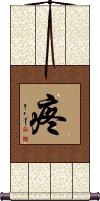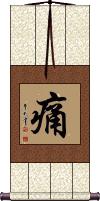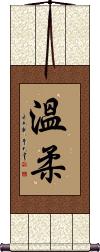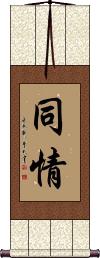Many custom options...
And formats...

Hurt in Chinese / Japanese...
Buy a Hurt calligraphy wall scroll here!
Personalize your custom “Hurt” project by clicking the button next to your favorite “Hurt” title below...
Hurt
ache / pain / sore / love fondly
疼 can mean hurt, ache, pain or sore in Chinese and old Korean Hanja.
It's also used to speak of the pain of love, and thus its definition also includes “love fondly.” This also means ache, hurt, tingle, or pain in Japanese but is not often seen as a lone Kanji like this in Japanese.
Pain
ache / sorrow
痛 means pain in Chinese and old Korean Hanja. It also means pain/hurt/bruise in Japanese but is seldom seen as a single Kanji (usually, at least a Hiragana is added to make the word “itai” which is what a Japanese person will scream when they are in pain).
Depending on the context, this word can mean hurt, ache, sorrow, or refer to damage to a human body. As a single character, the possible meanings are very open - so you can decide what it means to you, as long as the general meaning is still “painful.”
See Also: Hurt
Gentleness
溫柔 or “gentleness” is moving wisely, touching softly, holding carefully, speaking quietly, and thinking kindly.
When you feel mad or hurt, use your self-control. Instead of harming someone, talk things out peacefully. You are making the world a safer, gentler place.
Compassion
These two characters mean compassion and sympathy in Chinese, Japanese, and Korean, which makes this word universal.
Compassion is caring and understanding someone is hurt or troubled (even if you don't know them). It is wanting to help, even if all you can do is listen and say kind words. You forgive mistakes. You are a friend when someone needs a friend.
Not the results for Hurt that you were looking for?
Below are some entries from our dictionary that may match your Hurt search...
| Characters If shown, 2nd row is Simp. Chinese |
Pronunciation Romanization |
Simple Dictionary Definition |
ケガ see styles |
kega ケガ |
(noun/participle) (kana only) injury (to animate object); hurt |
傷 伤 see styles |
shāng shang1 shang shō きず |
to injure; injury; wound (1) wound; injury; cut; gash; bruise; scratch; scrape; scar; (2) chip; crack; scratch; nick; (3) flaw; defect; weakness; weak point; (4) stain (on one's reputation); disgrace; dishonor; dishonour; (5) (emotional) hurt; hurt feelings To injure, wound, hurt, harm, distress, A tr. of yakṣa. |
創 创 see styles |
chuàng chuang4 ch`uang chuang motomu もとむ |
to initiate; to create; to achieve (something for the first time) (1) wound; injury; cut; gash; bruise; scratch; scrape; scar; (2) chip; crack; scratch; nick; (3) flaw; defect; weakness; weak point; (4) stain (on one's reputation); disgrace; dishonor; dishonour; (5) (emotional) hurt; hurt feelings; (personal name) Motomu |
害 see styles |
hài hai4 hai gai がい |
to do harm to; to cause trouble to; harm; evil; calamity injury; harm; evil influence; damage hiṃsā; vihiṃsā; hurt, harm, injure. |
慍 愠 see styles |
yùn yun4 yün |
indignant; feel hurt |
損 损 see styles |
sǔn sun3 sun takuji たくじ |
to decrease; to lose; to damage; to harm; (coll.) to ridicule; to deride; (coll.) caustic; sarcastic; nasty; mean; one of the 64 hexagrams of the Book of Changes: ䷨ (n,adj-na,vs,vi) (1) loss; damage; harm; unprofitable; (noun or adjectival noun) (2) disadvantage; handicap; drawback; unfavorable; (personal name) Takuji To spoil, hurt, damage. |
瑕 see styles |
xiá xia2 hsia ka きず |
blemish; flaw in jade (1) wound; injury; cut; gash; bruise; scratch; scrape; scar; (2) chip; crack; scratch; nick; (3) flaw; defect; weakness; weak point; (4) stain (on one's reputation); disgrace; dishonor; dishonour; (5) (emotional) hurt; hurt feelings a flaw |
疵 see styles |
cī ci1 tz`u tzu kizu きず |
blemish; flaw; defect (1) wound; injury; cut; gash; bruise; scratch; scrape; scar; (2) chip; crack; scratch; nick; (3) flaw; defect; weakness; weak point; (4) stain (on one's reputation); disgrace; dishonor; dishonour; (5) (emotional) hurt; hurt feelings |
病 see styles |
bìng bing4 ping yamai やまい |
illness; CL:場|场[chang2]; disease; to fall ill; defect (1) illness; disease; (2) bad habit; weakness; fault Illness, disease; to hurt. |
硌 see styles |
gè ge4 ko |
(coll.) (of something hard or rough) to press against some part of one's body causing discomfort (like a small stone in one's shoe); to hurt; to chafe |
傷む see styles |
itamu いたむ |
(v5m,vi) (1) to hurt; to ache; to feel a pain; (2) to be injured; to be spoiled (e.g. food); to be damaged |
傷心 伤心 see styles |
shāng xīn shang1 xin1 shang hsin shoushin / shoshin しょうしん |
to grieve; to be broken-hearted; to feel deeply hurt (n,adj-no,vs,vi) heartbreak; grief; sorrow |
刺痛 see styles |
cì tòng ci4 tong4 tz`u t`ung tzu tung |
to tingle; to sting; to have a sudden sharp pain; (fig.) to hurt deeply; tingle; prick; sting; stab of pain |
害す see styles |
gaisu がいす |
(v5s,vs-c,vt) (1) (See 害する) to injure; to damage; to harm; to hurt; (v5s,vs-c,vt) (2) to kill; (v5s,vs-c,vt) (3) to hinder; to obstruct |
弄傷 弄伤 see styles |
nòng shāng nong4 shang1 nung shang |
to bruise; to hurt (something) |
怪我 see styles |
kega(p); kega けが(P); ケガ |
(noun/participle) (kana only) injury (to animate object); hurt |
損う see styles |
sokonau そこなう |
(irregular okurigana usage) (Godan verb with "u" ending) (1) to harm; to hurt; to injure; to damage; (auxiliary verb) (2) to fail in doing |
故障 see styles |
gù zhàng gu4 zhang4 ku chang koshou / kosho こしょう |
malfunction; breakdown; defect; shortcoming; fault; failure; impediment; error; bug (in software) (n,vs,vi) (1) fault; trouble; breakdown; failure; being out of order; (noun, transitive verb) (2) damage (to a part of the body); injury; hurt; (3) problem; hitch; obstacle; hindrance; (4) objection; protest |
有損 有损 see styles |
yǒu sǔn you3 sun3 yu sun uson |
to be harmful (to) hurt |
灼傷 灼伤 see styles |
zhuó shāng zhuo2 shang1 cho shang |
a burn (tissue damage from heat, chemicals etc); to burn (the skin etc); (fig.) (of anger, jealousy etc) to hurt (sb) |
無妨 无妨 see styles |
wú fáng wu2 fang2 wu fang |
no harm (in doing it); One might as well.; It won't hurt.; no matter; it's no bother |
疼死 see styles |
téng sǐ teng2 si3 t`eng ssu teng ssu |
to really hurt |
疼痛 see styles |
téng tòng teng2 tong4 t`eng t`ung teng tung toutsuu / totsu とうつう |
pain; (of a body part) to be painful; to be sore; to hurt; (of a person) to be in pain {med} throbbing pain |
痛む see styles |
itamu いたむ |
(v5m,vi) (1) to hurt; to ache; to feel a pain; (2) to be injured; to be spoiled (e.g. food); to be damaged |
脫皮 脱皮 see styles |
tuō pí tuo1 pi2 t`o p`i to pi |
to molt; to peel; fig. seriously hurt See: 脱皮 |
重傷 重伤 see styles |
zhòng shāng zhong4 shang1 chung shang juushou / jusho じゅうしょう omode おもで |
seriously hurt; serious injury serious wound; serious injury |
かちん see styles |
kachin かちん |
(adv-to,n) (1) (onomatopoeic or mimetic word) clink; clack; (2) (onomatopoeic or mimetic word) feeling annoyed; being offended; being hurt |
使受傷 使受伤 see styles |
shǐ shòu shāng shi3 shou4 shang1 shih shou shang |
hurt |
傷つく see styles |
kizutsuku きずつく |
(v5k,vi) (1) to be wounded; to get injured; (2) to get hurt feelings; (3) to get damaged; to get chipped; to get scratched |
傷める see styles |
itameru いためる |
(transitive verb) (1) to hurt; to injure; to cause pain; (2) to harm; to damage; to spoil; (3) to worry; to bother; to be grieved over; to afflict; (4) to cause financial loss; to hurt one's pocket |
Click here for more Hurt results from our dictionary
The following table may be helpful for those studying Chinese or Japanese...
| Title | Characters | Romaji (Romanized Japanese) | Various forms of Romanized Chinese | |
| Hurt | 疼 | tou / uzuku to / uzuku | téng / teng2 / teng | t`eng / teng |
| Pain | 痛 | tsuu / ita / tsu / ita | tòng / tong4 / tong | t`ung / tung |
| Gentleness | 溫柔 温柔 | wēn róu / wen1 rou2 / wen rou / wenrou | wen jou / wenjou | |
| Compassion | 同情 | dou jou / doujou / do jo | tóng qíng tong2 qing2 tong qing tongqing | t`ung ch`ing tungching tung ching |
| In some entries above you will see that characters have different versions above and below a line. In these cases, the characters above the line are Traditional Chinese, while the ones below are Simplified Chinese. | ||||
Successful Chinese Character and Japanese Kanji calligraphy searches within the last few hours...







